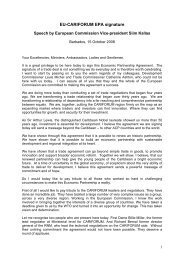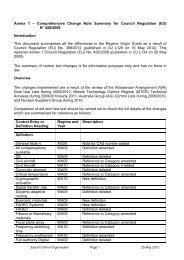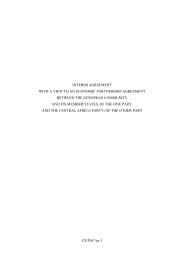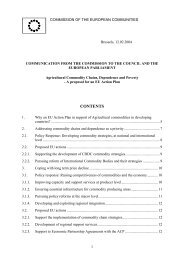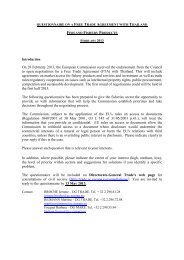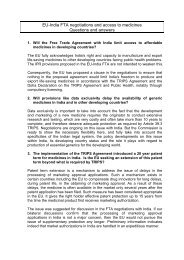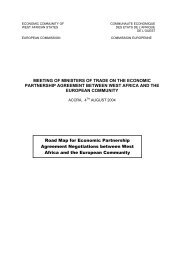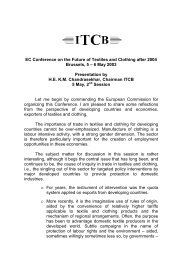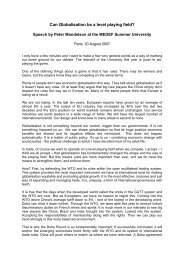Report on the Implementation of the derogation to ... - Trade Websites
Report on the Implementation of the derogation to ... - Trade Websites
Report on the Implementation of the derogation to ... - Trade Websites
Create successful ePaper yourself
Turn your PDF publications into a flip-book with our unique Google optimized e-Paper software.
Final <str<strong>on</strong>g>Report</str<strong>on</strong>g><br />
RoO Derogati<strong>on</strong> under <strong>the</strong> PACP-IEPA<br />
• Transport – Prior <strong>to</strong> <strong>the</strong> minimum wage rate increase <strong>to</strong> K 2.29 in January 2010, all three<br />
canneries provided company-sp<strong>on</strong>sored transport <strong>to</strong> and from work for employees, as an<br />
additi<strong>on</strong>al benefit. Following implementati<strong>on</strong> <strong>of</strong> <strong>the</strong> increase in minimum wage, canneries<br />
retracted this benefit <strong>on</strong> affordability grounds (from <strong>the</strong> perspective that with increased<br />
wages, workers could afford <strong>to</strong> cover <strong>the</strong>ir own transport costs; and, from a cannery<br />
perspective that <strong>the</strong> increase wage costs reduced <strong>the</strong> affordability <strong>of</strong> providing transport <strong>to</strong><br />
workers). Fur<strong>the</strong>r, in <strong>the</strong> case <strong>of</strong> two canneries, spin-<strong>of</strong>f businesses established with local<br />
transport providers <strong>to</strong> provide workers’ transport were reportedly abused by <strong>the</strong> PMV<br />
opera<strong>to</strong>rs.<br />
Workers, particularly those living c<strong>on</strong>siderable distances from canneries (i.e. over <strong>on</strong>e hour<br />
drive away), report issues with <strong>the</strong> lack <strong>of</strong> reliability and <strong>the</strong> high cost <strong>of</strong> transport. Female<br />
staff also raised c<strong>on</strong>cerns about security issues associated with catching transport before<br />
sunrise/after sunset. In light <strong>of</strong> <strong>the</strong>se issues (and <strong>the</strong>ir related influence <strong>on</strong> absenteeism<br />
levels), all three canneries reported <strong>to</strong> be re-c<strong>on</strong>sidering <strong>the</strong> provisi<strong>on</strong> pick-up/drop-<strong>of</strong>f<br />
transport services for workers. In resp<strong>on</strong>se <strong>to</strong> security issues, canneries have tailored shift<br />
hours <strong>to</strong> ensure workers <strong>on</strong> day shift have adequate time <strong>to</strong> return home prior <strong>to</strong> dark. For<br />
night shift workers, <strong>the</strong>y are permitted early entry <strong>to</strong> <strong>the</strong> cannery compound before sunset<br />
and may stay <strong>on</strong>site after finishing <strong>the</strong>ir shift until sunrise.<br />
• Housing – To cater for workers who live l<strong>on</strong>g distances from <strong>the</strong> cannery compound, RDTC<br />
has c<strong>on</strong>structed free dormi<strong>to</strong>ry accommodati<strong>on</strong> <strong>on</strong> cannery-owned land in Maiawara (about<br />
15 minutes from <strong>the</strong> cannery) for 100 workers. In partnership with local communities, RDTC<br />
is also financing <strong>the</strong> materials for <strong>the</strong> c<strong>on</strong>structi<strong>on</strong> <strong>of</strong> dormi<strong>to</strong>ries for rent <strong>to</strong> RDTC staff for K<br />
30.00/fortnight. To date, five dorms/houses have been c<strong>on</strong>structed which accommodate up<br />
<strong>to</strong> 50 staff (5 rooms per house, 2 x workers per room). Frabelle and SSTC are also reportedly<br />
c<strong>on</strong>sidering opti<strong>on</strong>s for providing housing assistance <strong>to</strong> workers.<br />
• Expatriate workers – Despite aspersi<strong>on</strong>s cast by European industry and parliamentary<br />
interests that PNG canneries are hiring large volumes <strong>of</strong> cheap foreign labour sourced from<br />
Asia, 79 this is not <strong>the</strong> case. All unskilled/producti<strong>on</strong> level jobs are reserved for PNG nati<strong>on</strong>als<br />
under <strong>the</strong> Employment <strong>of</strong> N<strong>on</strong>-Citizens Act 2007. During cannery visits <strong>the</strong>re was no<br />
evidence <strong>of</strong> foreign labour employed in producti<strong>on</strong>-level jobs. As menti<strong>on</strong>ed earlier,<br />
expatriate workers are employed in<strong>to</strong> management and high-level supervisory positi<strong>on</strong>s and<br />
are generally <strong>of</strong> Filipino origin. In prior studies, <strong>the</strong>re have been anecdotal reports <strong>of</strong><br />
mistreatment <strong>of</strong> local staff by foreigners, particularly verbal abuse/use <strong>of</strong> coarse language. 80<br />
Cannery management representatives c<strong>on</strong>firmed isolated incidences <strong>of</strong> c<strong>on</strong>flict between<br />
expatriate and local staff and indicated a zero <strong>to</strong>lerance policy for mistreatment <strong>of</strong> staff,<br />
whereby in such instances, <strong>the</strong> expatriate staff member has been terminated, had <strong>the</strong>ir<br />
foreign work permit cancelled and been repatriated from PNG. It is a requirement under<br />
PNG law that n<strong>on</strong>-citizen workers are pr<strong>of</strong>icient in English, Tok Pisin or Hiri Motu. 81 While<br />
Filipino staff are generally pr<strong>of</strong>icient in English, frustrati<strong>on</strong>s have been raised by nati<strong>on</strong>als<br />
workers c<strong>on</strong>cerning <strong>the</strong> use <strong>of</strong> <strong>the</strong>ir native t<strong>on</strong>gue (Tagalog, Visayan) in <strong>the</strong> workplace at<br />
times.<br />
• Grievance handling - Each cannery has policies in place for dealing with staff grievances.<br />
Interviewed workers were well aware <strong>of</strong> <strong>the</strong> respective processes in place in instances when<br />
issues arise (e.g. fighting, <strong>the</strong>ft, complaints against o<strong>the</strong>r workers etc.). Generally, workers<br />
first report <strong>to</strong> <strong>the</strong>ir immediate supervisor and <strong>the</strong>n, if <strong>the</strong> issue cannot be resolved as this<br />
level, <strong>the</strong> matter is taken <strong>to</strong> ei<strong>the</strong>r <strong>the</strong> HR Department, Security Department or Community<br />
79 For example, Fraga 2010.<br />
80 Sullivan et al. 2003; Sullivan et al. 2005.<br />
81 Employment <strong>of</strong> <strong>the</strong> N<strong>on</strong>-Citizens Act 2007.<br />
Linpico s.a.r.l. Page 64




